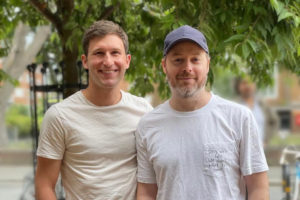
The newest start-up on the block, Cassyni, comes from a bunch of scholcomm start-up old timers — founded by Andrew Preston (Publons, now owned by Clarivate), Ben Kaube (Newsflo, acquired by Elsevier, and Kopernio, also now part of Clarivate), Peter Vincent (Kopernio, and also a Professor of Computational Fluid Dynamics at Imperial College London) and Freddie Witherden (Newsflo, Kopernio and Assistant Professor at Texas A&M), with Jan Reichelt (Mendeley, now owned by Elsevier, and Kopernio) as earliest backer. I spoke to Ben and Andrew last week, and asked them some of the questions I’ve explored with other start-ups such as Skilltype and DataSeer. (Do get in touch if you have started up in our space and have insights you could share with other budding entrepreneurs.)
In a nutshell: Cassyni is “relaunching online seminars”
Cassyni is a platform for setting up and running online seminars. Many of us have had a recent crash course in organizing online talks and events, so we know for ourselves the profusion of tools and systems involved. Cassyni’s USP is that it provides a one-stop-shop for:
- Calendaring — checking who can speak when, letting people book themselves in to available slots — otherwise a case of juggling multiple conflicting email threads
- Attendee management — registration, confirmation / follow up emails, timely reminders etc
- Online presenting and recording — it’s built onto Zoom, but handily preconfigures some of the things speakers find fiddly, like the right settings to record both your presentation and the video of you speaking
- Metadata management — from soliciting, collecting and displaying speaker abstracts and bios (and alerting you to any that are missing) to transcribing talks, capturing references and displaying them in a structured format, assigning a DOI, and providing “cite this talk” snippets to copy and paste.

Cassyni essentially cherry-picks the features of Doodle, Eventbrite, Zoom, YouTube (and so on) to fit an academic / seminar use case. Seminar organizers can subscribe to Cassyni at a personal, departmental or institutional level (the launch announcements were timed to coincide with the first institutional customer, Te Herenga Waka — Victoria University of Wellington). Obviously, it’s a timely addition to the academic toolkit, given how many academic settings are still subject to restrictions on face-to-face seminars. I guess the team are gambling on the pandemic proving to the be the tipping point for a long term shift, and while it remains to be seen whether digital-first teaching and learning will persist at the current level, good tools can be catalysts in their own right. Andrew points out that the fact that they’ve seen strong early uptake in New Zealand — which has seen much lower COVID disruption than other countries — is an encouraging indication that these behaviors are here to stay.
What’s killer about it?
The clean, intuitive interface and the ease of the one-stop-shop will be the most effective weapons in the Cassyni arsenal. At the other end of the ambition spectrum, Cassyni could be ‘the one’ that democratizes knowledge development. Andrew and Ben were passionate about this when we spoke — proud that Cassyni might help accelerate the “evaporation of geographic constraints that have existed for tens if not hundreds of years” — essentially (and again, this tool is more about judicious combination of existing tech rather than in-and-of-itself innovation genius) by supporting asynchronous interactivity, i.e., seminars can be viewed from anywhere, at any time, for free — and each has a Q&A section that forms the basis of a community of interest.
Cassyni might help accelerate the “evaporation of geographic constraints that have existed for tens if not hundreds of years”
Ben and Andrew used the PyFR seminar series as an example. “PyFR is an open-source Python based framework for solving advection-diffusion type problems on streaming architectures using the Flux Reconstruction approach of Huynh.” (Shamelessly copied and pasted from the PyFR website as I’m not going to embarrass myself by trying to translate it into plain language). The point is that the PyFR team built the software over many years, during which a big community of users grew up around it, but they didn’t really know who was using it, for what. They used Cassyni to run a series of invited talks, which became a nexus for discussion within that community — unconstrained by the costs, inconveniences and inequities of in-person meetings. An obvious next step would be to enable participants to subscribe to the Q&A feeds (as you can with, e.g., comment sections in blogs such as this) so that you can really stay tuned into the conversation. There is also potential, as the platform, and its own community and/or partnerships grow, to provide audience building tools such as those we provide with Kudos Pro (helping researchers connect to and communicate with other users/visitors outside their existing network — full disclosure, I am a Co-founder and Chief Customer Officer).
What can other entrepreneurs learn from Cassyni?
Let’s be honest that Cassyni isn’t your typical scholcomm start-up. The founders all have extremely valuable, relevant experience and connections, and were able to self-fund the development of the platform. But there are still some useful takeaways from this:
-
Know your target audience in depth.
Cassyni’s founders’ roots and immersion in their target market means they deeply and personally understand the problem to which their tool is a solution. If business is all about incremental gains, then there is great potential for competitive advantage in basing your product spec and proposition not on a vicarious ‘persona’ but on first-hand, nuanced, visceral knowledge of what is / isn’t painful for your users, what they will / won’t struggle with, what they will / won’t be able to get through their expenses. -
You will never have all the market data you want, or that others demand of you…
Every credible business plan must include an estimate of the size of the target market. For the Cassyni team, one aspect of this was to answer an impossible question: how many seminars are there each year? Andrew Preston: “No-one knows! Every researcher we have spoken to has participated in seminars, the space could be similar in scale to academic publications – and yet there are almost no records of these seminars happening.” Sometimes the very market condition that creates the demand for your start-up means that it’s hard to demonstrate the need for your start-up. How do you quantify a market that doesn’t exist yet? -
…So you need to demonstrate sufficient credibility that others’ will trust your best guess.
You have to make assumptions, use proxies, trust your knowledge of the market – and hence (see point 1) it will be a benefit if your sector knowledge is evident and credible to others, such as potential investors, too. -
Roll your sleeves up.
The team started working on Cassyni in early 2021. They tested their first seminar in March, and 6 months later, have launched a full-featured system and sold their first institutional licence. That is an astonishing pace of progress for a group of 3-4 people. Yes, it helps that they have done it all before (in some cases twice). But it also helps that they threw themselves into it personally. Having coders among your founders helps you translate your vision into reality without the risk of it being “lost in translation”. Having founders doing your sales and marketing means customers see the real passion, vision and credibility underpinning your idea / business. Never think that by starting your own business you are off to spend your days issuing helpful instructions from your corner office. Yes, you need to “only do what only you can do”. But don’t be precious about what that turns out to be.
And finally, what’s the “story behind the name“?
 Andrew and Ben joked that Cassyni is another output from the “Jan Reichelt name generator” since it joins Mendeley and Kopernio as a play on the name of a historical scientist (Giovanni Domenico Cassini). FWIW, I did suggest they might diversify the training data for the algorithm so that the next name that comes out is based on something other than an old white man. Keep an eye out for Cor.io, SciHoppa, Booché and Banneka … (your own suggestions for scholcomm start-up names are welcome below!)
Andrew and Ben joked that Cassyni is another output from the “Jan Reichelt name generator” since it joins Mendeley and Kopernio as a play on the name of a historical scientist (Giovanni Domenico Cassini). FWIW, I did suggest they might diversify the training data for the algorithm so that the next name that comes out is based on something other than an old white man. Keep an eye out for Cor.io, SciHoppa, Booché and Banneka … (your own suggestions for scholcomm start-up names are welcome below!)
Discussion
2 Thoughts on "Start-up Stories: Cassyni — The One-Stop-Shop for Online Seminars — Or, How to Get Your Product Built and Launched in 6 Months"
I both love and hate online conferences. I love not printing posters or spending thousands on flights and hotels.
But the engagement is really lacking. My last conference, I paid $200 in grant funds and talked to 0 people. No one in my team even mentioned the event afterwards. We didn’t even notice it had passed. So I am skeptical of how enduring the market for this will be. Still, I hope that they can make online conferences work. If it is less terrible than Gathertown I am ready to give them a go.
There’s one question that I’m always pondering at the moment: lifetime of content? How long would you expect seminar data to last if it was in person? So should we expect digital to be different? i.e. Should we expect the content to last 2 years? 5 years? Longer? Are there parts of the content that form the core and the rest can be eliminated? I think the answer to that question can provide clarity to a number of start ups in this space, although I’m not sure academics know the answer themselves (the gib response might say forever, but change their minds once they think about it).



